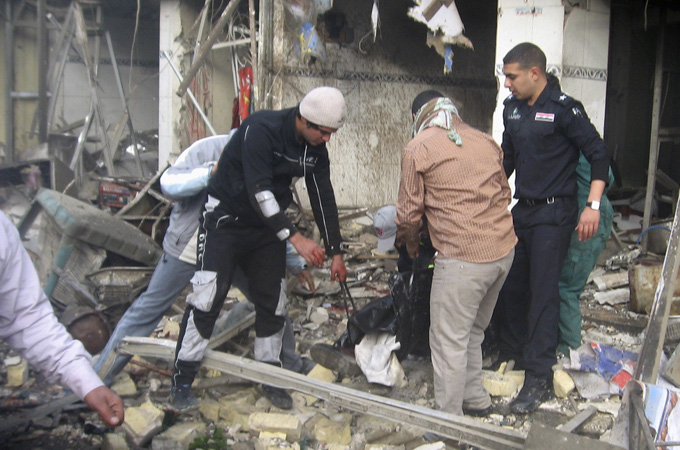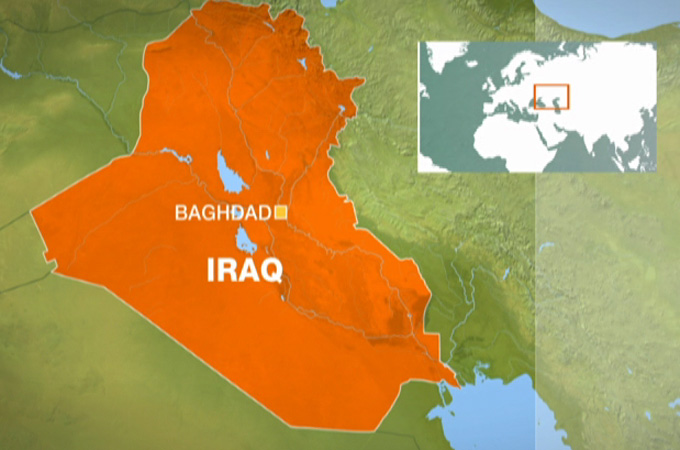Shia pilgrims killed in Baghdad explosions
Bombs in Iraqi capital kill at least two people, a day after blasts left at least 70 dead amid growing sectarian fears.

 |
| Friday’s attacks come a day after the nation’s bloodiest violence in a year, which left at least 70 people dead [Reuters] |
Multiple explosions in Baghdad have killed at least two people, officials have said, a day after a wave of bombings killed more than 70 people, further deepening the country’s sectarian divide at a time of ongoing political crisis.
Four explosions rocked central Baghdad around noon, Dahr Jamail, Al Jazeera’s correspondent in the Iraqi capital, reported.
Keep reading
list of 4 itemsPalestinian Prisoner’s Day: How many are still in Israeli detention?
‘Mama we’re dying’: Only able to hear her kids in Gaza in their final days
Europe pledges to boost aid to Sudan on unwelcome war anniversary
“There were … three roadside bombs across Baghdad, with a total of two dead and 17 wounded, the vast majority of those being Shia pilgrims,” Jamail said.
Rockets were fired against Baghdad’s Green Zone, the hub of international presence in the city, as Iraq’s military marked its anniversary with a parade on Friday.
Al Jazeera’s Omar al-Saleh, also reporting from Baghdad, said: “The day started with two improvised explosive devices that targeted the Shia pilgrims heading to the holy city of Karbala. A number of people were killed and over a dozen were injured.
“Later on a wave of mortar rounds fell in different parts of the Iraqi capital. The most prominent, a mortar round fell inside the Green Zone, that’s the fortified Green Zone where the Iraqi government is based [and] the US embassy is based.”
Some of the explosions were rockets and mortar rounds, police said. At least two buildings in northern and central Baghdad were hit, leaving 10 injured.
“It [the attacks] gives you a sense of how security is going in this country, and of course if you compare it to the bloody attacks yesterday that killed more than 70 people, [it seems] Iraq is not safe and that is the fear on the ground,” Saleh said.
Co-ordinated attacks
 |
The wave of attacks, which comes after the country’s bloodiest day of violence in a year, occurred in the prelude to the Shia holy day of Arbaeen, when followers travel to Karbala to mark the end of 40 days of mourning for Imam al-Hussein, the grandson of the Prophet Muhammad.
On Thursday, co-ordinated attacks targeted Shia Muslims and their communities, leading to an atmosphere of fear that recalls the bloody sectarian war from 2006 to 2007.
In the morning, a bomb planted on a parked motorcycle, and another two roadside devices, killed at least nine people and wounded 35 others in the impoverished Sadr City district in northeastern Baghdad, sources said.
“There was a group of day labourers gathered, waiting to be hired for work. Someone brought his small motorcycle and parked it nearby,” said a police officer at the scene who declined to be named.
“A few minutes later it blew up, killed some people, wounded others and burned some cars.”
Two bomb attacks in Kadhimiyah, another predominantly Shia district in Baghdad’s north, killed another 15 people and wounded 31, an interior ministry official said.
In the afternoon, a suicide bomber struck Shia pilgrims on their way to the holy city of Karbala. The attack, near Nasiriyah about 200km south of Baghdad, killed at least 45 Iraqis, according to police and hospital reports.
“Political leaders fight each other for power, and we pay the price,” said Ahmed Khalaf, a labourer near the site of attacks, in reference to the political tension between Sunni and Shia leaders.
Arrest warrant
Last month, Nouri al-Maliki, the prime minister, ordered an arrest warrant against his Sunni Vice President Tareq al-Hashimi on charges of terrorism.
In a subsequent move, Maliki called for a vote of no confidence against Saleh el-Mutlaq, the deputy prime minister and another leading Sunni politician.
Since the warrant was issued, the Sunni-led Iraqiya political bloc has boycotted parliament.
Maliki on Wednesday stated that if the boycott continues, those participating would be placed on “extended leave” and replacements would be found for their positions.
Further complicating the situation, the hardline Shia bloc, led by anti-US cleric Moqtada al-Sadr, said it would not be a part of any negotiations that include rival political group Asaeb al-Haq.
Maliki recently stated that there could be no security in Iraq without political stability.